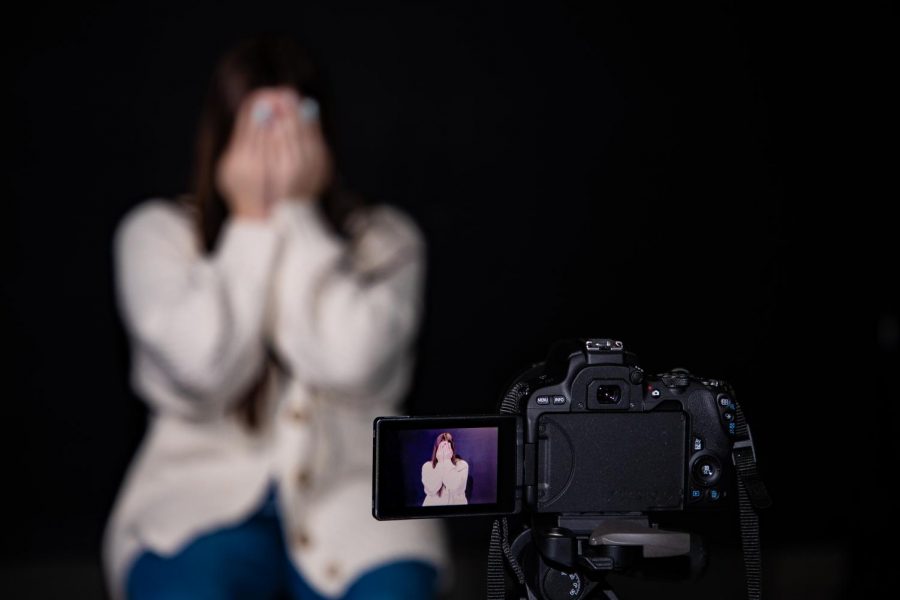Battling burnout
Although seen as the dream-job, creating on YouTube is becoming a burden to many
Photo by Kaitlyn Rogers
Photo Illustration
March 13, 2020
The “King of YouTube” PewDiePie, vlog-star Elle Mills and parody creator Alex Wassabi are all wildly successful in their own right. Between them, millions of fans check in every time they upload on YouTube. So with all of their perceived success, why have each of them (and countless other creators) at times taken a step back from publishing videos and cited “Creator Burnout” as the reason why?
In the infant stages of YouTube, when one could seldom find a video with views in the six figures, times were simpler for creators. As of then, those on the site didn’t consider themselves creators, but as hobbyists who had the free time to make videos for a small niche audience. This was largely because, in those days, YouTube wasn’t a career. How could it be? There was no way to turn a profit.
In 2020, however, after years of the AdSense program (the system responsible for those 15, 30, even 90 second ads that interlude your favorite videos), it is well known that making it big on the platform pays very, very well. The lifestyle that YouTube can pay for is plastered across the platform and has recently created the stereotype of an “L.A. vlogger.” It has been advertised to the point where 75% of kids aged 6-17 chose “YouTuber” as their ideal career in a study published by The Sun.
As the incentive to make videos grew, competition did as well. As of January, more than 16,000 channels had more than a million subscribers. While each of these channels have been successful in at least garnering an audience, that doesn’t equate to success.
That’s where creating on YouTube gets complicated because what does lead to success isn’t as straightforward. Hours watched, content ratings and apparently, dumb luck, are all factors in the equation. This confusing, frustrating system is referred to as “the algorithm.”
For many of these creators, this algorithm and the harsh restrictions it imposes are the reason why creating videos, which often starts out as a passion project, becomes a burden. Many creators believe that if they do not publish a certain quantity of content, their videos will stop appearing in their viewers feed. For those who rely on YouTube as a full-time job, this is a nightmarish scenario. Years of building one’s brand are put in jeopardy whenever one leaves subscribers without engaging content. The worst possible outcome for these creators would be seeing views stagnate, or even decrease.
It is these fears that propel many YouTubers into relentless productivity. For those publishing once, twice, even three times a week, taking any time off feels like a defeat.
Every YouTuber is their own boss. When you are your own brand, there is no one deciding how many hours you work. This can lead to a relaxed career for some, who see it as a relief to only be accountable to one’s self. But for others, no one is limiting how hard you work. This leads to enormous amounts of stress and worry. Then when success doesn’t come, it’s easy for creators to blame themselves. They then try to overcompensate by working harder and longer, until the dream job of children all over the world becomes a huge burden.
Felix Kjellberg, known by anyone with an internet connection as PewDiePie, is a prime example of a YouTuber suffering from burnout and who’s own experience brought this issue into the limelight. PewDiePie was the most watched creator of 2019 with more than 4 billion views. This shows that the issue of burnout isn’t specific to struggling creators, but a problem that has reached the top of the YouTube ladder.
Kjellberg is currently on hiatus. While he assures fans he will return to the platform when his feelings of stress and lack of motivation subsides, not all YouTuber breaks are sure to be intermittent, but some are permanent. Linus Tech Tips is considering retirement. Filthy Frank, LeafyIsHere and FPSRussia, all channels with millions of subscribers, have all quit YouTube.
Burnout is increasingly becoming an epidemic, not an exception. And until the system that has made these celebrities who they are updates to become more creator friendly, more are sure to leave.
















